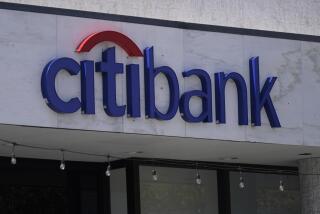Approval of Ameriquest Settlement Sought
Attorneys who contend that Ameriquest Mortgage Co. overcharged thousands of customers by using “bait and switch” tactics will ask a state judge today to approve a settlement that could return as much as $50 million to borrowers in California and three other states.
Ameriquest and the plaintiffs have agreed to the terms, but attorneys in a separate case are asking San Mateo County Superior Court Judge Carol Middlesteadt to modify the settlement on grounds that it doesn’t go far enough in providing relief to borrowers.
The 5-year-old case is one of several major legal battlefronts for the Orange-based company and its parent, Ameriquest Capital Corp., which disclosed recently that it is in discussions with regulators from 30 states who have raised questions about its lending practices.
Ameriquest and its affiliates are the nation’s largest mortgage lenders in the “sub-prime” market, which serves homeowners who have bad credit, heavy debts or other issues.
The plaintiffs, represented by Burlingame, Calif., law firm Cotchett, Pitre, Simon & McCarthy, accused Ameriquest of violating a California unfair competition law prohibiting “any unlawful, unfair or fraudulent business act or practice.”
The settlement also would apply to borrowers in Texas, Alabama and Alaska. The class at one point included more than 30 states, but the judge excluded states whose laws provided greater relief than California’s.
According to Niall McCarthy, an attorney for the plaintiffs, borrowers promised one set of terms would discover later that they had been saddled with far more onerous rates and fees.
“This was a straight-up case of bait and switch,” he said.
Ameriquest contended that there was no statistical evidence of bait and switch, saying most of its borrowers actually wound up with better loans than initially promised in its written disclosures. In court filings, it said it had agreed to the settlement reluctantly after five years of intense litigation and “countless hours” of negotiations.
“The settlement pertains to nearly 10-year-old issues, and Ameriquest instituted many years ago lending ... practices and computer systems to better protect customers,” the company said in a statement. “The settlement cannot be used to show or even imply that Ameriquest violated any law or regulation. Ameriquest’s lending practices far exceed federal, state and local regulation.”
The private company is owned by Los Angeles billionaire Roland E. Arnall. Its customers had filed more than 19,000 claims in the class action, and McCarthy estimated that the number could grow as high as 25,000 by the time the claims period ran out July 25.
However, the agreement is being challenged by attorneys who have filed a rival lawsuit in U.S. District Court in San Francisco. That suit, asking to represent a national class of Ameriquest borrowers, is in its early stages, and Ameriquest has moved to have it tossed out or have portions dismissed. Its allegations include violations of the federal Truth in Lending Act and failure to properly train and supervise employees.
Aaron Myers, a lawyer in the federal case, said the settlement notices sent to borrowers in the San Mateo case were vague and provided no way for them to calculate what they probably would recover. They also should have been sent out in Spanish as well as English, he said.
Myers contended that the effect might well be to induce borrowers to release Ameriquest from liability when they could recover more by participating in other lawsuits. He also noted that although Ameriquest’s maximum payment is capped at $50 million, it could pay as little as $15 million to borrowers under the terms of the settlement, along with $10 million to the plaintiffs attorneys.
“This settlement allows Ameriquest to purchase broad immunity on the cheap,” said Myers, who is seeking to have the settlement modified to address his concerns.
The heart of the settlement is a formula based on a borrower’s annual percentage rate, or APR, a gauge of borrowing costs that figures in upfront loan fees as well as the interest rate.
Those borrowers whose final APRs rose 0.9% or more from their good faith estimate -- the preliminary written disclosure of loan terms -- would qualify to share in the award.
William Hamm, an economics consultant retained by the plaintiffs, estimated that the average award to such a borrower would be $3,200, and that it was plausible that at least 10,000 borrowers would qualify. That would bring the total of the APR-related awards to more than $30 million, he said.
In addition, Hamm noted, class members who paid a prepayment penalty that was not listed in their good faith estimate would be entitled to additional compensation. He said he couldn’t estimate how much that might be, but noted that 5,661 claims seeking such compensation had been filed as of June 10.
The settlement applies to Californians who obtained mortgages from Ameriquest or its predecessor company, Long Beach Mortgage Co., from Oct. 25, 1996, through Feb. 29, 2004. It also applies to residents of Texas, Alaska or Alabama who took out Ameriquest mortgages from April 8, 1998, through Feb. 29, 2004.
Special correspondent Mike Hudson contributed to this report.
More to Read
Inside the business of entertainment
The Wide Shot brings you news, analysis and insights on everything from streaming wars to production — and what it all means for the future.
You may occasionally receive promotional content from the Los Angeles Times.











